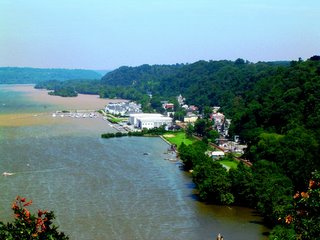 I've received a couple of queries regarding Port Deposit, the village on the Susquehanna River pictured in my Christmas post. I also drove past it just a couple of hours ago as "She Who Must Not Be Named" and I returned from New York, where we had spent the day traipsing around to museums [and in her case, museum shops]. So it's on my mind.
I've received a couple of queries regarding Port Deposit, the village on the Susquehanna River pictured in my Christmas post. I also drove past it just a couple of hours ago as "She Who Must Not Be Named" and I returned from New York, where we had spent the day traipsing around to museums [and in her case, museum shops]. So it's on my mind.Here's a broader view of the village, from Chesapeake Bay Magazine [here].
The accompanying article explain's the village's name this way:
Port Deposit (originally called Creswell's Ferry) reportedly got its name from the fact that mountains of lumber were once rafted downriver from upstate Pennsylvania and "deposited" at the town's wharves. Huge rafts or "arks"-some of them up to 100 feet long with a 20-foot beam were cobbled together from logs and crudely shaped into double-ended vessels steered with a single 40-foot sweep. In 1826, for instance, some 1,500 arks arrived in town, carrying coa1, lumber, flour and whiskey from the uplands. One "raftsman" claimed that the downriver trip took three hours from where he lived, and that he would walk 28 miles to get back home the same day, to be ready for the next morning's trip. That's a heck of a commute by today's standards, but supposedly there were a number of taverns along the way where a fellow could rest his weary feet and, um, re-hydrate. Of course, the arks couldn't go upstream, so they were broken up and sold as lumber. Many of the older Port Deposit homes, in fact, were built from the logs harvested from the abandoned arks. (Today's remodelers have a time of it when they discover the wall they want to alter is actually 14 inches thick.)
Oh, one more thing people might find of interest -- Port Deposit is downriver from Three Mile Island.
No comments:
Post a Comment